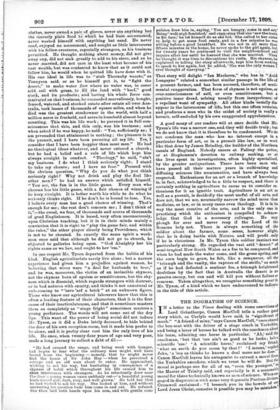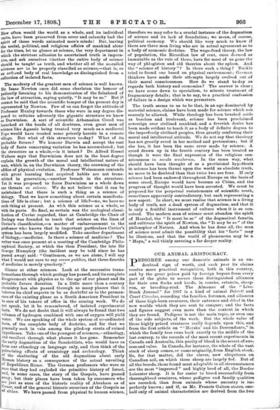THE DOGMATISM OF SCIENCE.
TN a letter to the Times dealing with some assertions of
Lord Grimtborpe, Canon MacColl tells a rather good story which, as Carlyle would have said, is "significant of much." "A friend of mine," says Canon MacColl, "once shared the box-seat with the driver of a stage coach in Yorkshire, and being a lover of horses he talked with the coachman about his team, admiring one horse in particular. `Ah,' said the coachman, but that 'oss ain't as good as he looks ; he's a
scientific 'oss.' A scientific horse,' exclaimed my friend, what on earth do you mean by that ?" I means,' replied Jebu, a 'oss as thinks be knows a deal more nor he does.' Canon MacColl leaves his antagonist to extract a moral from the Yorkshire anecdote, which we trust he will do. But the moral is perhaps one for all of us, " even the youngest," as the Master of Trinity said, and especially is it a seasonable moral for those technically known as men of science. When& gaged in disputation with some very dogmatic Puritan divines, Cromwell exclaimed : "I beseech you in the bowels of our Lord Jesus Christ, conceive it possible you may be mistaken," How often would the world as a whole, and its individual units, have been preserved from error and calamity had the spirit of those words animated men's minds! But, leaving the social, political, and religions affairs of mankind alone for the time, let us glance at science, the very department in which the strictest adhesion to ascertained truth is impera- tive, and ask ourselves 7,itether the entire body of science should be taught. as truth, and whether all of the so-called sciences are 1.,o be properly classified as science,—that is, as an ordered body of real knowledge as distinguished from a collection of isolated facts.
The modesty of the greatest men of science is well known. sir Isaac Newton once did some charlatan the honour of patiently listening to his demonstration of the falsehood of the law of attraction, saying quietly, "It may be so." But it cannot be said that the scientific temper of the present day is represented by Newton. Few of us can forget the attitude of Professor Huxley towards those who were in any degree dis- posed to criticise adversely the gigantic structure we know as Darwinism. A sort of scientific Athanasian Creed was launched at the heads of all doubters, even great men of science like Agassiz being treated very much as a medimval Pope would have treated some priestly heretic in a remote village. But what of this structure to-day ? What of its probable future? We honour Darwin and accept the vast body of facts concerning variation he has accumulated ; but the structure as a whole,—is it intact ? Dr. Alfred Russel Wallace says that Darwinism does not in the least degree explain the growth of the moral and intellectual nature of man, which is, on the Darwinian theory, the crowning of the edifice of physical evolution. Professor Weissmann contends with great learning that acquired habits are not trans- mitted in generation,—another breach in the structure. Yet it was proposed to force Darwinism as a whole down our throats as science. We do not believe that it can be maintained that there is such a thing as a science of biology. That we know something about certain manifesta- tions of life is clear ; but a science of life?—no, we have no such thing at present. As with this science as a whole, so with its parts. So final, so certain was the zoological classi- fication of Cuvier regarded, that at Cambridge the Chair of Zoology was founded to teach that science on the lines of Onvier's classification,—a matter of embarrassment to the professor who knows that in important particulars Cuvier's system has been largely modified. Take another department of biology,—medicine. Is there a science of medicine ? The writer was once present at a meeting of the Cambridge Philo- sophical Society, at which the then President, the late Sir George Humphry (the incident may be told since be has passed away) said: "Gentlemen, as we are alone, I will say what I would not care to say coram publico, that three-fourths of medicine is merely quackery."
Glance at other sciences. Look at the successive trans- formations through which geology has passed, and its complete disagreement with physics as to the age of our planet and its probable future duration. In a little more than a century chemistry has also passed through so many phases that it behoves its chief experts to be as doubtful as to the perman- ence of the existing phase as a South American President to be sure of his tenure of office in the coming week. We do not speak, let it be remembered, of isolated experimental facts. We do not doubt that it will always be found that two volumes of hydrogen combined with one of oxygen will yield water. We are speaking of the whole system of co-ordinated facts, of the complete body of doctrine, and for that we generally seek in vain among the piled-up strata of ruined ''I hypotheses. Take one of the youngest of sciences,—ethnology, and recollect through what phases it has gone. Remember the early dogmatism of the Sanskritists, who would have us form our ethnology on language only, and then think of the Pulverising effects of craniology and archmology. Think Of the shattering of the old dogmatism about early Roman history as a consequence of the actual unveiling of Republican Rome. The German professors who were so sure that they had exploded the primitive history of Israel, and, in some cases, the story of the Gospels, have passed away ; but their places have been taken by successors who are just as sure of the historic reality of Abraham as of Cw.sar, and of the general historic structure of the Gospels as of either. We have passed from physical to human science,
therefore we may refer to a crucial instance of the dogmatism of science and its lack of foundation; we mean, of course, political economy. We should like very much to know if there are three men living who are in actual agreement as to a body of economic doctrine. The wage-fund theory, the law of population, the Ricardian law of rent, once deemed as immutable as the rule of three, have for most of us gone the way of phlogiston and old theories about the spleen. And the " science of history " ? Is there such a thing ? Buckle tried to found one based on physical environment; German thinkers have made their attempts largely evolved out of their moral consciousness. How do we stand to-day as regards both history and economics ? The answer is clear ; we have come down to specialism, to minute treatment of fragmentary details; that is to say, to a practical confession of failure in a design which was premature.
The truth seems to us to be that, in an age dominated by material science, claims have been made for science which can scarcely be allowed. While theology has been brushed aside as baseless and irrelevant, science has been proclaimed sovereign over civilised mankind, and a feverish desire has been made evident to teach it as a body of definite dogma to the imperfectly civilised peoples, thus greatly confusing their moral and intellectual attitude. We do not say that theology has not greatly erred in her method and pretensions; but if she has, it has been the same error made by science.• A creed drawn up in the fourth century has been treated as though it were the final expression of the religious con- sciousness in secula seculorum. In the same way, what should have been thought of as a provisional hypothesis in science has been thrust upon the world as absolute truth, no more to be doubted than that twice two are four. If only science had been endowed throughout Europe on the basis of some creed, Europe would have become as China, and the progress of thought would have been arrested. We must be prepared for the perpetual restatements of scientific truth, sometimes apparently contradictory, but each representing a new aspect. In short, we must realise that science is a living body of truth, not a dead system of dogmatism, and that it is only a fruitful instrument of culture when it is so con- ceived. The modern man of science must abandon the spirit of Haeckel, the " It must be so" of the dogmatical fanatic, and cultivate the spirit of Newton, the "It may be so " of the philosopher of Nature. And when he has done all, the man of science must admit the possibility that his " facts " may be illusions, and that the world of phenomena may be a
Maya," a veil thinly covering a far deeper reality.











































 Previous page
Previous page